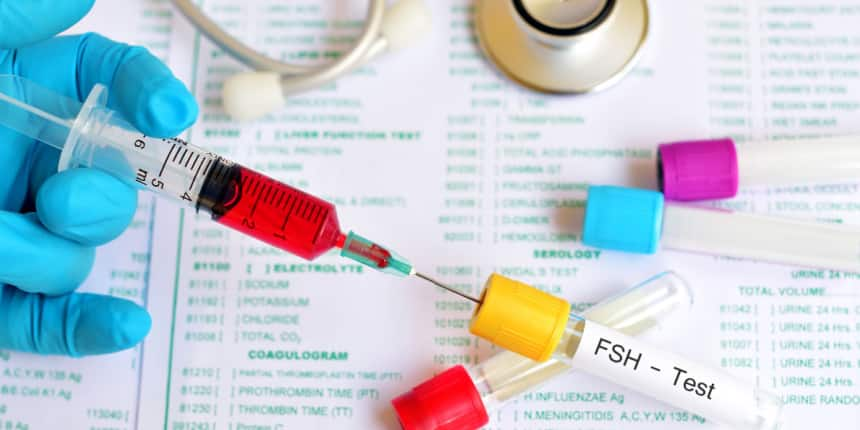FSH Full Form
what is the full form of FSH?
FSH is an abbreviation for Follicle Stimulating Hormone. It is a hormone present in the human body. Hormone is nothing more than a protein produced by the pituitary glands. The Follicle Stimulating Hormone (FSH) promotes the formation of ovarian follicles and maintains menstrual cycle regularity.
What is FSH?
The Follicle Stimulating Hormone (FSH) is important in the creation and proliferation of eggs in women, as well as the maintenance of menstrual cycles. They are found not only in females but also in males.
FSH, or follicle-stimulating hormone, is a hormone that helps men produce sperm.
Follicle-stimulating hormone (FSH) is essential in both men's and women's reproductive organs.
The brain, primarily the pituitary gland, produces Follicle Stimulating Hormone (FSH). A blood test, however, can detect the presence of Follicle Stimulating Hormone (FSH) in the body. An abnormal level of this hormone indicates reproductive difficulties.
- what is the full form of FSH?
- What is FSH?
- Structure
- Functions
- FSH Test
- Measurement of FSH
- When should someone get the FSH checked?
- Consequences of High FSH levels
- Consequences of Low FSH Levels
- Conclusion

Structure
Follicle-stimulating hormones (FSH) is a 35.5 kDa glycoprotein heterodimer composed of alpha and beta polypeptide units.
It has a similar structure to Luteinizing Hormone (LH), Thyroid-Stimulating Hormone (TSH), and human Chorionic Gonadotropin (hCG).
The alpha subunits of the glycoproteins LH, FSH, TSH, and hCG are all the same and have 96 amino acids, while the beta subunits differ.
FSH has a 111 amino acid beta subunit (FSH), which gives its particular biologic function and is in charge of interacting with the Follicle-Stimulating Hormone receptor.
Functions
The Follicle Stimulating Hormone (FSH) is an important hormone for both reproduction and sexual wellness. The Follicle Stimulating Hormone (FSH) performs the following functions:
It is required for both male and female reproductive stages. This is because FSH generates and maintains the conditions for female egg formation and male sperm production.
It is also in charge of producing oestrogen and testosterone, which are known as sex hormones.
Follicle Stimulating Hormone is known to regulate the menstrual cycle in women.
FSH Test
The FSH test is a blood test used to assist diagnose ovulation difficulties. FSH levels might be elevated if a woman is not ovulating or is experiencing menopause. If the woman is on fertility drugs, her FSH levels may be elevated.
The FSH test can assist detect whether or not a woman is ovulating. FSH levels are typically measured on days 3, 5, and 7 of the menstrual cycle. FSH levels are usually at their peak on day seven. FSH levels can also be measured during in-vitro fertilisation (IVF).
Measurement of FSH
Follicle-stimulating hormone is normally assessed during the early follicular phase of the menstrual cycle, which lasts three to five days after menstruation. Estrogen and Progesterone levels are at their lowest during the menstrual cycle.
FSH levels are measured in International Units (IU). One IU of Human Urinary FSH is defined as the amount of FSH with activity equal to 0.11388 mg of pure Human Urinary FSH.
When should someone get the FSH checked?
If you are experiencing the following symptoms, you should have your FSH levels checked that is,
Difficulty in conceiving
Period irregularities or no periods at all
Consequences of High FSH levels
FSH is in charge of follicle development and growth in the ovaries.
Elevated FSH levels may indicate ovarian failure or decreased ovarian reserve.
FSH levels can also be used to predict reproductive potential.
Consequences of Low FSH Levels
One possibility is that you will be unable to conceive. This is because FSH stimulates the ovaries to create eggs.
You may also have difficulty sustaining a pregnancy. FSH is essential for foetal development and early brain development.
FSH also aids in the regulation of other hormones in the body. When FSH levels are low, thyroid function and oestrogen levels can suffer. This can result in issues such as weight gain, infertility, and irregular periods.
Low FSH levels can also lead to a loss of bone density. This can raise the chance of osteoporosis later in life.
Conclusion
The pituitary gland produces FSH as a hormone. This hormone aids in the regulation of both men's and women's reproductive systems. It stimulates the formation of eggs in the ovaries in women. It also aids in the management of the menstrual cycle. FSH stimulates sperm production in males.
Frequently Asked Questions (FAQs)
Full form of FSH is Follicle Stimulating Hormone.
FSH regulates the menstrual cycle and increases egg development in the ovaries. FSH levels in women fluctuate during the menstrual cycle, with the highest levels occurring right before the ovary releases an egg. This is referred to as ovulation. FSH aids in the regulation of sperm production in males.
The pituitary gland produces the follicle-stimulating hormone. It controls the function of both the ovaries and the testes. Its absence or low levels might result in infertility in both men and women.
Every 60 to 120 minutes, it is released in a rhythmic pattern. GnRH stimulates the pituitary gland to create follicle-stimulating hormone (FSH), the hormone that initiates follicle (egg) development and raises oestrogen levels, the predominant female hormone.
FSH, which rises after menopause, may be to blame for the weight gain and bone loss that many women experience in their forties.
